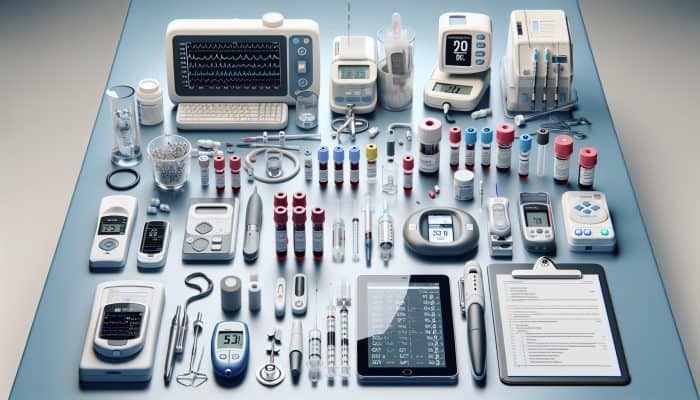Your Ultimate Resource for Understanding Diabetes Blood Testing
Defining the Importance of a Diabetes Blood Test

Diabetes Blood Test in Abingdon-on-Thames: A diabetes blood test is a pivotal medical procedure aimed at evaluating your blood glucose levels. This assessment is critical not only for diagnosing diabetes but also for monitoring its progression over time. Regular testing is essential for managing your overall health effectively, enabling you to detect any abnormalities in your glucose levels that could signify prediabetes or other metabolic disorders. Various types of blood tests exist, each tailored to meet specific needs, including:
- Fasting Blood Glucose Test
- Oral Glucose Tolerance Test (OGTT)
- Haemoglobin A1c Test
- Random Blood Glucose Test
- Continuous Glucose Monitoring
- Fructosamine Test
By understanding the various tests available, you are empowered to take proactive control of your health and make informed decisions regarding your diabetes management.
The Critical Role of Regular Testing in Diabetes Management
Regular testing is essential for the effective management of diabetes, as it allows individuals to consistently monitor their blood sugar levels over time. This ongoing assessment is vital for facilitating necessary adjustments to medication, dietary habits, and lifestyle choices, all of which contribute to maintaining optimal health. The advantages of committing to a routine of regular testing include:
- Early detection of diabetes-related issues
- Prevention of serious complications such as neuropathy and retinopathy
- Enhanced management of blood sugar fluctuations
- Informed decision-making regarding nutrition and exercise
- Improved communication and collaboration with healthcare professionals
By establishing a routine of consistent blood tests, individuals can adopt a proactive approach to their health and overall well-being, ensuring they stay on top of their diabetes management.
Determining the Appropriate Frequency for Diabetes Blood Tests
The frequency of diabetes blood testing is influenced by several factors, including whether you have a confirmed diagnosis of diabetes, your personal risk factors, and specific recommendations from your healthcare provider. For individuals diagnosed with diabetes, testing may need to occur anywhere from several times a day to every few months. In contrast, those at risk for developing diabetes may be advised to undergo testing on an annual basis. Regular medical check-ups are essential for monitoring changes in your health and facilitating timely adjustments to your management strategy.
Locating Reliable Diabetes Blood Testing Services in Abingdon-on-Thames

Healthcare Facilities and Hospitals Providing Diabetes Testing Services
In Abingdon-on-Thames, a diverse range of healthcare facilities offer diabetes blood testing services. Among these, Abingdon Hospital stands out for its comprehensive diabetes care and extensive testing options. Additionally, various GP clinics located throughout the town are well-equipped to perform blood tests and manage diabetes effectively. These local resources ensure that residents have convenient access to essential diagnostic services without the inconvenience of long-distance travel.
Exploring Private Clinics for Enhanced Diabetes Testing Services
For those seeking quicker or more personalised services, private clinics in Abingdon-on-Thames provide a variety of options for diabetes blood testing. These private facilities often deliver results more rapidly than public services and may offer greater flexibility in appointment scheduling. Some noteworthy private clinics include:
- The Abingdon Clinic
- Oxford Private Hospitals
- Healthcheck Clinic
- Viva Health
Choosing a private service can enhance your overall experience, particularly if you have specific health concerns or require immediate results.
Mobile Testing Units: Making Diabetes Testing Accessible to All

Mobile testing units represent an innovative solution for diabetes blood testing, particularly beneficial for individuals who may struggle to travel to a clinic. These units periodically visit Abingdon-on-Thames, bringing essential testing services directly to your community. This initiative is especially advantageous for elderly patients or those with mobility challenges, ensuring that everyone has the opportunity to monitor their health effectively and conveniently.
Pharmacies Offering Convenient Diabetes Testing Services
Several pharmacies in Abingdon-on-Thames provide accessible options for diabetes blood testing. Well-known pharmacies such as Boots and Superdrug frequently offer blood glucose testing services that do not necessitate an appointment. This convenience allows individuals to quickly check their blood glucose levels while managing other daily tasks, making it an ideal choice for those with busy schedules.
Expert Perspectives on Diabetes Blood Testing in Abingdon-on-Thames
Recommendations from Experts Regarding Testing Frequency
Experts indicate that the frequency of diabetes blood testing should be tailored to individual health conditions. For instance, a patient with unstable blood sugar levels may benefit from more frequent assessments compared to an individual whose diabetes is well-controlled. Real-life examples illustrate that customised testing schedules can lead to marked improvements in patient outcomes by significantly reducing the risk of complications.
The Transformative Impact of Regular Testing on Your Life
Incorporating regular testing into your routine can greatly enhance your quality of life by enabling more effective diabetes management. By routinely assessing your glucose levels, you can make informed decisions about your dietary choices and physical activity, which ultimately helps to lower the risk of complications. Simple strategies, such as scheduling tests for the same time every month or using reminders, can simplify the process and make it more manageable.
Innovations Shaping the Future of Diabetes Testing
Recent advancements in diabetes testing have led to the development of more accurate and less invasive methods, including continuous glucose monitors (CGMs) and flash glucose monitoring systems. These innovations allow for real-time tracking of glucose levels with minimal discomfort, greatly benefiting patients by providing immediate feedback and improving their capacity to manage their condition effectively.
Essential Steps to Prepare for Your Diabetes Blood Test
Key Preparations You Should Take Before the Test
Before undergoing a diabetes blood test, it is crucial to adhere to any pre-test instructions provided by your healthcare provider. Fasting may be required for certain tests, such as the fasting blood glucose test, where you must typically refrain from eating for a minimum of eight hours beforehand. Following these guidelines is vital to ensure the accuracy of your results, emphasising the importance of confirming all necessary details with your doctor in advance.
What to Expect During the Blood Testing Process
During the diabetes blood test, you can expect a straightforward procedure that involves a simple blood draw, usually from your arm. The process is quick and relatively painless, often taking less than five minutes to complete. A healthcare professional will sterilise the area, insert a needle to extract blood, and may apply a small bandage afterward. Most individuals find that the experience is far less intimidating than they initially anticipated.
What Happens After Your Blood Test?
After completing your diabetes blood test, you will typically be asked to wait briefly for your results, especially if they require immediate analysis. Your healthcare provider will later interpret the results and discuss them with you during a follow-up appointment. This conversation is critical for understanding your glucose levels and determining any necessary adjustments to your diabetes management plan.
Understanding Your Diabetes Test Results
Recognising What Normal Test Results Mean
Normal blood glucose levels can vary, but a fasting level below 6 mmol/L is generally considered acceptable. Understanding these ranges is fundamental for interpreting your results, as they indicate whether your glucose levels fall within a healthy spectrum. Being aware of what constitutes normal levels empowers you to manage your health proactively and effectively.
Interpreting Elevated Results: What Do They Indicate?
Elevated blood glucose levels, typically exceeding 7 mmol/L when fasting, may suggest the presence of diabetes or prediabetes. If your results fall outside the normal range, it is crucial to consult your doctor for a proper diagnosis and treatment plan. Early intervention is essential, as it can enhance management and reduce the risk of long-term complications associated with uncontrolled diabetes.
How Your Results Are Analysed and Interpreted
Your healthcare provider will interpret your test results by taking into account various factors, including your medical history, current symptoms, and risk factors. This comprehensive analysis ensures that your results are appropriately contextualised, guiding any necessary adjustments in your treatment or management plan. Engaging in open discussions with your doctor regarding these interpretations is vital for effective diabetes management.
Effective Strategies for Managing Diabetes Post-Testing
Essential Lifestyle Modifications for Better Health
Effective diabetes management often necessitates significant lifestyle changes, particularly concerning diet and exercise. Adopting a balanced diet rich in whole foods and low in refined sugars can significantly aid in regulating your blood sugar levels. Additionally, incorporating regular physical activity, such as walking, cycling, or engaging in other forms of exercise, can enhance your insulin sensitivity and help maintain a healthy weight, which is crucial for comprehensive diabetes management.
The Role of Medication in Supporting Diabetes Management
For many individuals with diabetes, medication plays a pivotal role in controlling blood sugar levels. Depending on your specific health condition, your doctor may prescribe insulin or oral medications such as metformin. These medications are effective in managing glucose levels, facilitating better overall control of your diabetes. Regular consultations with your healthcare provider ensure that your medication remains suitable and effective for your individual needs.
Long-Term Management Strategies for Sustaining Health
The long-term management of diabetes involves regular check-ups, continuous monitoring of blood sugar levels, and adapting lifestyle choices to maintain healthy glucose levels. Establishing a consistent routine can support ongoing monitoring and facilitate timely adjustments to your management plan, ultimately helping to prevent complications related to diabetes. This proactive approach is essential for sustaining long-term health and well-being.
Research-Backed Benefits of Diabetes Blood Testing in Abingdon-on-Thames
The Impact of Early Diagnosis on Health Outcomes
Early detection of diabetes can significantly prevent severe complications, such as heart disease and kidney damage. For example, patients diagnosed early may have the opportunity to implement lifestyle changes that substantially reduce their risk factors. Real-world scenarios demonstrate that proactive management stemming from early detection can lead to improved health outcomes and a better quality of life.
The Advantages of Local Testing Services
Local testing services in Abingdon-on-Thames offer numerous benefits, including convenience and prompt access to healthcare services. By utilising nearby facilities, individuals can seamlessly integrate testing into their routine without the stress of long-distance travel. Leveraging these local resources enables residents to effectively monitor their health and promptly address any concerns that may arise.
The Evolution of Diabetes Testing Practices
Methods for testing diabetes have advanced significantly, becoming more accurate and less invasive over time. Innovations such as finger-prick blood tests and continuous glucose monitors have transformed patient experiences, allowing for more comfortable testing without sacrificing accuracy. These improvements have made managing diabetes more straightforward and accessible for those living with the condition.
Enhancing Overall Health Through Regular Testing
Regular diabetes blood tests play a critical role in monitoring your health over time, enabling timely adjustments to treatment approaches. Consistent testing helps track fluctuations in blood sugar levels, providing invaluable information that can influence dietary and lifestyle decisions. Emphasising the importance of ongoing testing not only aids in immediate management but also fosters sustainable long-term health.
Addressing Common Concerns and Frequently Asked Questions
Is There Pain Associated with the Blood Test?
The blood test typically involves a quick needle prick, which is usually not painful but may cause brief discomfort. Most patients find that the anticipation of the procedure is more daunting than the actual experience, which generally lasts only a few seconds.
Can You Eat Prior to the Test?
Fasting is often required before a diabetes blood test; however, this requirement varies based on the specific type of test being conducted. Always confirm with your healthcare provider whether fasting is necessary for your particular test to ensure accurate results.
What is the Expected Wait Time for Test Results?
The time taken to receive test results can range from a few hours to several days, depending on the testing facility and the specific type of test performed. Your healthcare provider will inform you when you can expect your results and will ensure a follow-up appointment to discuss them thoroughly.
What Steps Should You Take if Your Results Are Elevated?
If your results indicate elevated blood sugar levels, it is vital to consult your healthcare provider without delay. They will assist in interpreting the results within the context of your overall health and may recommend lifestyle modifications or medications to help effectively manage your blood sugar levels.
Can Diabetes Be Reversed?
While diabetes cannot be entirely reversed, it can be effectively managed through lifestyle changes, proper weight management, and appropriate medication. Some individuals with Type 2 diabetes may achieve remission, allowing them to maintain normal glucose levels without the need for medication.
What Symptoms Are Associated with High Blood Sugar Levels?
Common symptoms linked to high blood sugar levels include increased thirst, frequent urination, fatigue, blurred vision, and headaches. If you experience these symptoms, it is essential to check your blood sugar levels and consult your healthcare provider for further guidance.
How Does Stress Impact Blood Sugar Levels?
Stress can significantly affect blood sugar levels, causing them to rise due to the release of hormones such as cortisol. Effectively managing stress through techniques such as mindfulness, physical activity, and sufficient sleep can help maintain stable glucose levels, which is essential for overall health.
When is the Best Time to Test Blood Sugar Levels?
The optimal time for testing blood sugar levels can vary based on individual circumstances. Common times for testing include first thing in the morning, before meals, or two hours after eating to assess the impact of food on blood glucose levels.
How Can You Access Support for Diabetes Management?
Accessing support for diabetes management can be achieved through local health services, support groups, or online communities. Engaging with others who share similar experiences can provide valuable resources, emotional support, and shared insights throughout your diabetes journey.
Is Diabetes Blood Testing Covered by Insurance?
Most health insurance plans in the UK typically cover diabetes blood testing; however, it is important to confirm with your provider for specific coverage details. Discussing your needs with your healthcare provider can help you effectively navigate any associated costs.



I really appreciate how you’ve highlighted the variety of diabetes blood tests available. It was a bit overwhelming for me when I was first diagnosed, but learning about each test helped me see how they contribute to more personalized care. For instance, I’ve found the HbA1c test particularly insightful because it gives a clearer picture of my blood sugar control over time, rather than just a snapshot view.